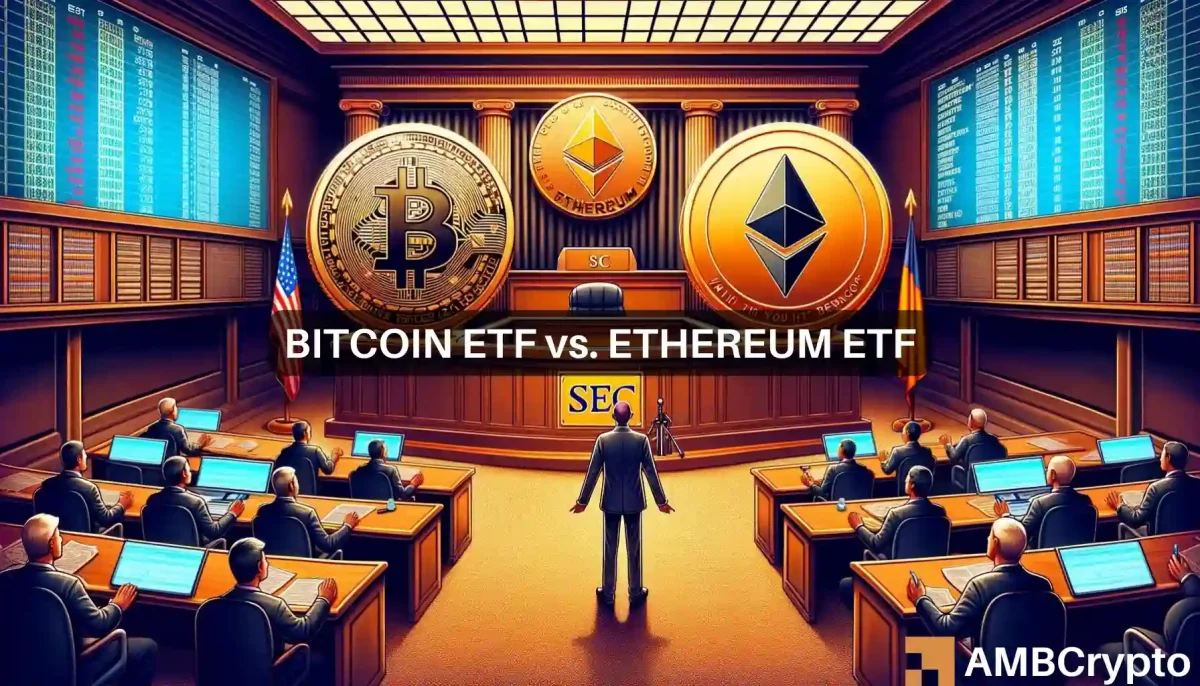Bitcoin And Ethereum Etf Canada Unlocking Investment Potential

Bitcoin and Ethereum ETFs in Canada are igniting excitement in the investment landscape, offering a novel way for investors to gain exposure to cryptocurrency without the complexities of direct buying. As these funds gain traction, they are reshaping investment strategies and drawing interest from both seasoned traders and newcomers alike.
The emergence of these ETFs marks a significant milestone in Canada’s financial markets, providing a regulated framework that bolsters investor confidence while enhancing accessibility to digital assets. With the approval timelines and evolving regulatory environment, the spotlight is now on how these investment vehicles can transform the way Canadians engage with cryptocurrencies.
Overview of Bitcoin and Ethereum ETFs in Canada
The introduction of Bitcoin and Ethereum ETFs (Exchange-Traded Funds) has revolutionized the investment landscape in Canada. These financial instruments allow investors to gain exposure to cryptocurrencies without having to directly buy and store them. ETFs function by pooling funds from multiple investors to purchase underlying assets, which can be stocks, bonds, or in this case, cryptocurrencies. This makes it simpler for investors, as ETFs can be traded on stock exchanges just like traditional shares.In the Canadian market, the significance of Bitcoin and Ethereum ETFs is notable.
They provide a regulated environment for cryptocurrency investment, which appeals to both retail and institutional investors looking for safer ways to engage with the volatile crypto market. The path to approval for these ETFs was marked by rigorous scrutiny and regulatory processes, resulting in a timely launch that has shaped the investment behavior in Canada.The approval process for Bitcoin and Ethereum ETFs in Canada began in earnest around 2020.
The first Bitcoin ETF, launched by Purpose Investments, was approved in February 2021, marking a significant milestone. Ethereum ETFs followed suit later the same year, with several providers entering the market.
Regulatory Environment

The role of the Canadian Securities Administrators (CSA) is pivotal in the approval of cryptocurrency ETFs. This umbrella organization comprises various provincial regulators that establish a framework for the trading of securities in Canada. The CSA has been keen on ensuring that ETFs comply with strict regulatory standards to protect investors.Canadian regulations governing cryptocurrency ETFs include guidelines on disclosure, risk management, and custody requirements.
These regulations are designed to ensure that investors are adequately informed and that assets are securely held, reducing the risk of fraud or mismanagement.The implications of Canadian regulations extend beyond its borders, influencing international cryptocurrency ETF markets. Countries observing Canada’s regulatory framework may consider adopting similar standards, thereby creating a more cohesive global investment environment for cryptocurrencies.
Market Impact of Bitcoin and Ethereum ETFs
Since the launch of Bitcoin and Ethereum ETFs in Canada, the impact on the cryptocurrency market has been profound. The introduction of these ETFs has led to increased trading volumes and heightened investor interest. For instance, within weeks of the Bitcoin ETF launch, it recorded over $400 million in assets under management, setting a record for the fastest accumulation of capital in the ETF space.Statistics reveal that the trading volume for these ETFs has consistently outpaced traditional cryptocurrencies, signaling a shift in investor preference.
While Bitcoin and Ethereum have experienced significant price fluctuations, their ETF counterparts have offered a more stable investment vehicle, attracting both seasoned and new investors.When comparing Bitcoin and Ethereum ETFs to direct investments in cryptocurrencies, it’s evident that ETFs provide a more structured and regulated approach. Investors are often drawn to the potential for lower risk and the convenience of trading on stock exchanges, as opposed to navigating crypto exchanges directly.
Investment Strategies Utilizing Bitcoin and Ethereum ETFs
There are various investment strategies that investors can adopt when incorporating Bitcoin and Ethereum ETFs into their portfolios. These strategies can range from long-term buy-and-hold plans to more active trading approaches. Understanding the nature of these ETFs can help investors mitigate risk and optimize returns.A diversified portfolio can be achieved by allocating a certain percentage to Bitcoin and Ethereum ETFs alongside traditional assets such as stocks and bonds.
This approach allows investors to benefit from the growth potential of cryptocurrencies while reducing overall portfolio volatility. Investors should also employ risk management techniques when dealing with cryptocurrency ETFs. Strategies may include setting stop-loss orders to limit potential losses, regularly reviewing portfolio performance, and adjusting allocations based on market conditions.
Future Trends and Predictions
Emerging trends in the Canadian cryptocurrency ETF market suggest a growing acceptance and integration of digital assets into mainstream finance. With institutional investment in this space increasing, we can expect further innovation and product offerings, including leveraged and inverse ETFs related to cryptocurrencies.Future developments may also see the introduction of more diversified cryptocurrency ETFs, incorporating a broader range of digital assets beyond Bitcoin and Ethereum.
This could cater to growing investor interest in altcoins and DeFi (Decentralized Finance) projects.The impact of institutional investment is already observable, with major financial institutions showing increasing interest in cryptocurrency ETFs. This trend could lead to greater adoption and ultimately influence regulatory frameworks as more players enter the market.
Comparison with Other Investment Vehicles
When comparing Bitcoin and Ethereum ETFs with mutual funds and stocks, several key differences and similarities emerge. Cryptocurrency ETFs typically offer higher volatility and potential returns than traditional mutual funds, which are often more conservative in their investment strategies. A table illustrating these distinctions can clarify the comparisons:
| Aspect | Bitcoin/Ethereum ETFs | Mutual Funds | Stocks |
|---|---|---|---|
| Volatility | High | Low to Moderate | Varies |
| Liquidity | High | Moderate | High |
| Management Fees | Low | Higher | Moderate |
| Regulatory Scrutiny | High | Very High | Moderate |
Investing in ETFs comes with its own set of advantages and disadvantages compared to purchasing cryptocurrencies directly. ETFs provide a more regulated framework, but they may also come with management fees and potential tracking errors.
Community Reactions and Sentiment

The launch of Bitcoin and Ethereum ETFs in Canada has elicited varied public sentiment and investor reactions. Many view these ETFs as a legitimization of cryptocurrencies, leading to increased confidence among investors. Social media platforms and online communities have played a crucial role in shaping perceptions, with discussions about the pros and cons of investing in ETFs versus direct cryptocurrency purchases.Case studies of investor experiences highlight the mix of excitement and caution.
Some investors report significant returns since their initial investments in cryptocurrency ETFs, while others emphasize the importance of thorough research and risk assessment.As online communities continue to grow, they serve as valuable resources for sharing information and experiences related to cryptocurrency ETFs, further influencing sentiment and investment strategies.
Educational Resources for Investors
For those interested in learning about Bitcoin and Ethereum ETFs, several educational resources are available. These include online courses, webinars, and articles published by financial institutions and educational platforms. Tracking ETF performance and market trends can be facilitated by utilizing financial news websites and investment apps that offer real-time data and analytics. Investors are encouraged to stay updated on market developments to make informed decisions.Continuing education in the rapidly evolving cryptocurrency landscape is crucial.
As regulations change and new investment opportunities emerge, investors who prioritize education will likely be better equipped to navigate the complexities of the crypto market.
Wrap-Up

As we wrap up this exploration of Bitcoin and Ethereum ETFs in Canada, it’s clear that these financial products are not just trends; they represent a shift in how individual and institutional investors perceive and interact with cryptocurrencies. The evolving landscape suggests that the future holds even more opportunities for growth and innovation in the ETF space, potentially solidifying their role in diversified investment portfolios across the nation.
User Queries
What are Bitcoin and Ethereum ETFs?
Bitcoin and Ethereum ETFs are exchange-traded funds that allow investors to buy shares representing these cryptocurrencies, providing an easier and more regulated way to invest.
How do Bitcoin and Ethereum ETFs differ from buying the cryptocurrencies directly?
ETFs offer a more convenient approach, as they are traded like stocks on exchanges, eliminating the need for wallets and private keys associated with direct cryptocurrency purchases.
Can I invest in Bitcoin and Ethereum ETFs through a regular brokerage account?
Yes, Bitcoin and Ethereum ETFs can typically be purchased through standard brokerage accounts just like any other stock or ETF.
Are Bitcoin and Ethereum ETFs subject to the same regulations as other ETFs?
Yes, these cryptocurrency ETFs are governed by the same regulatory frameworks as traditional ETFs, ensuring compliance and investor protection.
What is the potential risk of investing in Bitcoin and Ethereum ETFs?
While they provide exposure to cryptocurrencies, these ETFs can also be volatile and are influenced by market conditions, making them subject to investment risks similar to direct cryptocurrency investments.


